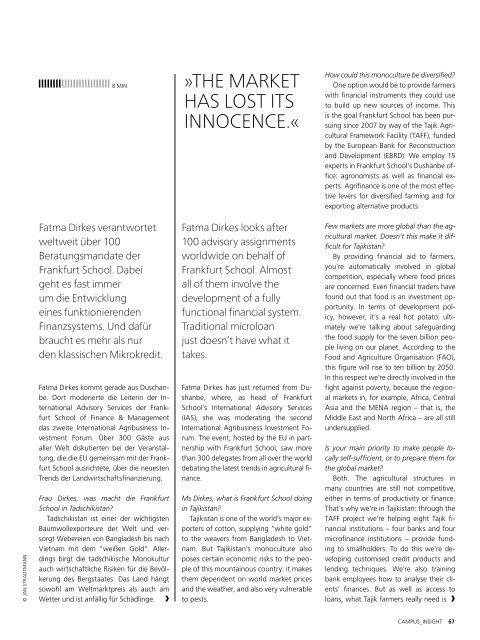FINANCE FOR ALL ? - Frankfurt School of Finance & Management
FINANCE FOR ALL ? - Frankfurt School of Finance & Management
FINANCE FOR ALL ? - Frankfurt School of Finance & Management
Erfolgreiche ePaper selbst erstellen
Machen Sie aus Ihren PDF Publikationen ein blätterbares Flipbook mit unserer einzigartigen Google optimierten e-Paper Software.
8 MIN<br />
»THE MARKET<br />
HAS LOST ITS<br />
INNOCENCE.«<br />
How could this monoculture be diversified?<br />
One option would be to provide farmers<br />
with financial instruments they could use<br />
to build up new sources <strong>of</strong> income. This<br />
is the goal <strong>Frankfurt</strong> <strong>School</strong> has been pursuing<br />
since 2007 by way <strong>of</strong> the Tajik Agricultural<br />
Framework Facility (TAFF), funded<br />
by the European Bank for Reconstruction<br />
and Development (EBRD). We employ 15<br />
experts in <strong>Frankfurt</strong> <strong>School</strong>’s Dushanbe <strong>of</strong>fice:<br />
agronomists as well as financial experts.<br />
Agrifinance is one <strong>of</strong> the most effective<br />
levers for diversified farming and for<br />
exporting alternative products.<br />
© JAN stradtmann<br />
Fatma Dirkes verantwortet<br />
weltweit über 100<br />
Beratungsmandate der<br />
<strong>Frankfurt</strong> <strong>School</strong>. Dabei<br />
geht es fast immer<br />
um die Entwicklung<br />
eines funktionierenden<br />
Finanzsystems. Und dafür<br />
braucht es mehr als nur<br />
den klassischen Mikrokredit.<br />
Fatma Dirkes kommt gerade aus Duschanbe.<br />
Dort moderierte die Leiterin der International<br />
Advisory Services der <strong>Frankfurt</strong><br />
<strong>School</strong> <strong>of</strong> <strong>Finance</strong> & <strong>Management</strong><br />
das zweite International Agribusiness Investment<br />
Forum. Über 300 Gäste aus<br />
aller Welt diskutierten bei der Veranstaltung,<br />
die die EU gemeinsam mit der <strong>Frankfurt</strong><br />
<strong>School</strong> ausrichtete, über die neuesten<br />
Trends der Landwirtschaftsfinanzierung.<br />
Frau Dirkes, was macht die <strong>Frankfurt</strong><br />
<strong>School</strong> in Tadschikistan?<br />
Tadschikistan ist einer der wichtigsten<br />
Baumwollexporteure der Welt und versorgt<br />
Webereien von Bangladesh bis nach<br />
Vietnam mit dem "weißen Gold". Allerdings<br />
birgt die tadschikische Monokultur<br />
auch wirtschaftliche Risiken für die Bevölkerung<br />
des Bergstaates: Das Land hängt<br />
sowohl am Weltmarktpreis als auch am<br />
Wetter und ist anfällig für Schädlinge.<br />
Fatma Dirkes looks after<br />
100 advisory assignments<br />
worldwide on behalf <strong>of</strong><br />
<strong>Frankfurt</strong> <strong>School</strong>. Almost<br />
all <strong>of</strong> them involve the<br />
development <strong>of</strong> a fully<br />
functional financial system.<br />
Traditional microloan<br />
just doesn’t have what it<br />
takes.<br />
Fatma Dirkes has just returned from Dushanbe,<br />
where, as head <strong>of</strong> <strong>Frankfurt</strong><br />
<strong>School</strong>’s International Advisory Services<br />
(IAS), she was moderating the second<br />
International Agribusiness Investment Forum.<br />
The event, hosted by the EU in partnership<br />
with <strong>Frankfurt</strong> <strong>School</strong>, saw more<br />
than 300 delegates from all over the world<br />
debating the latest trends in agricultural finance.<br />
Ms Dirkes, what is <strong>Frankfurt</strong> <strong>School</strong> doing<br />
in Tajikistan?<br />
Tajikistan is one <strong>of</strong> the world’s major exporters<br />
<strong>of</strong> cotton, supplying “white gold”<br />
to the weavers from Bangladesh to Vietnam.<br />
But Tajikistan’s monoculture also<br />
poses certain economic risks to the people<br />
<strong>of</strong> this mountainous country: it makes<br />
them dependent on world market prices<br />
and the weather, and also very vulnerable<br />
to pests.<br />
Few markets are more global than the agricultural<br />
market. Doesn’t this make it difficult<br />
for Tajikistan?<br />
By providing financial aid to farmers,<br />
you’re automatically involved in global<br />
competition, especially where food prices<br />
are concerned. Even financial traders have<br />
found out that food is an investment opportunity.<br />
In terms <strong>of</strong> development policy,<br />
however, it’s a real hot potato: ultimately<br />
we’re talking about safeguarding<br />
the food supply for the seven billion people<br />
living on our planet. According to the<br />
Food and Agriculture Organisation (FAO),<br />
this figure will rise to ten billion by 2050.<br />
In this respect we’re directly involved in the<br />
fight against poverty, because the regional<br />
markets in, for example, Africa, Central<br />
Asia and the MENA region – that is, the<br />
Middle East and North Africa – are all still<br />
undersupplied.<br />
Is your main priority to make people locally<br />
self-sufficient, or to prepare them for<br />
the global market?<br />
Both. The agricultural structures in<br />
many countries are still not competitive,<br />
either in terms <strong>of</strong> productivity or finance.<br />
That’s why we’re in Tajikistan: through the<br />
TAFF project we’re helping eight Tajik financial<br />
institutions – four banks and four<br />
micr<strong>of</strong>inance institutions – provide funding<br />
to smallholders. To do this we’re developing<br />
customised credit products and<br />
lending techniques. We’re also training<br />
bank employees how to analyse their clients’<br />
finances. But as well as access to<br />
loans, what Tajik farmers really need is<br />
CAMPUS_INSIGHT<br />
67


